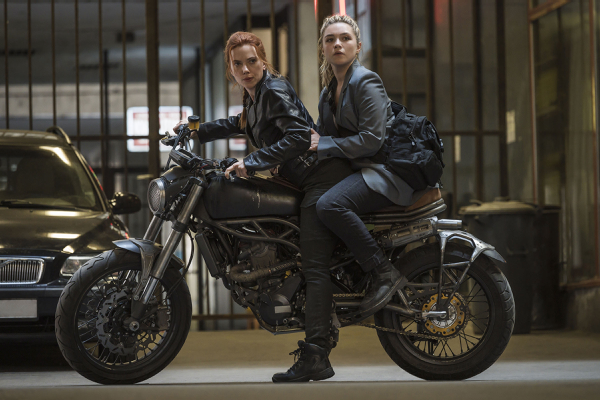Movie review by Greg Carlson
The prerequisites for continued Marvel Cinematic Universe domination are met: a script balancing eye-popping action and emotionally-charged character development; a narrative that functions as a standalone entertainment but also plugs directly into the massive, always-expanding mainframe; an expert ensemble capable of playing both tongue-in-cheek metanarrative and earnest pathos as required from scene to scene. And as an added bonus for those who keep their scorecards up to date, we finally learn what happened in Budapest.
For fans, the lengthy wait for “Black Widow” was worth it. Despite the very real potential for franchise fatigue — the amount of so-called Phase Four content, which includes the already available Disney+ “WandaVision,” “The Falcon and the Winter Soldier,” and “Loki,” with another ten small screen titles and ten more theatrical features on the way, is… a lot. But one look at director Cate Shortland’s solid entry confirms that Scarlett Johansson most certainly merits her own standalone victory lap following Natasha Romanoff’s fate in “Avengers: Endgame.”
Shortland brings her keen feature filmmaking chops to “Black Widow” as a welcome addition to the talented pool of storytellers who can match the Kevin Feige house style without any significant artistic compromise. For my money, James Gunn remains the most recognizable and distinctive directorial voice in the stable, but Shortland’s previous features — “Somersault” (2004), “Lore” (2012), and “Berlin Syndrome” (2017) — form an engrossing and intense cinematic hat trick that rivals the filmography of any director on the Marvel team.
“Black Widow” runs 134 minutes to the 145 minutes of meme-generator “F9,” but it can teach the Fast and Furious gang a thing or two about family. The ties that bind kickstart a white-knuckle, running-on-empty, opening action sequence set in 1995 Ohio that serves as a prelude for a closer look at the gender-based costs of the mysterious Red Room and its unethical programs. As General Dreykov, Ray Winstone makes a menacing adversary to our hero. Screenwriter Eric Pearson ups the ante in his use of Taskmaster, playing with the themes of patriarchy and doubling/mirroring Natasha’s emphasis on and interest in lineage.
Several critics have compared “Black Widow” to the Bourne series of political thrillers based on the adventures of Robert Ludlum’s gifted assassin. The resemblance most certainly extends to the specialized training of the lead characters and the stylistic focus on intense stunt work and kinetic hand-to-hand combat. But Shortland, who includes a clip of “Moonraker” along with evidence that Nat can recite Christopher Wood’s James Bond dialogue by heart, resists taking things too seriously, despite the tragic shadows that darken Romanoff’s origin story.
“Black Widow” is closer to the Christopher McQuarrie “Mission: Impossible” films than to Bourne, bending toward elements of the fantastic and liberal doses of visual and verbal wit (not to mention a shared affinity for a great motorcycle chase). David Harbour’s bearish Alexei “Red Guardian” Shostakov struggles to squeeze into the old uniform and Florence Pugh’s Yelena Belova mocks the signature Marvel landing pose. Rachel Weisz’s Melina Vostokoff is funny, too. She just isn’t given as much to do. If indeed the torch has been passed from Johansson to Pugh, who has looked every bit the star since her stunning breakout performance in “Lady Macbeth,” the Black Widow legacy is in fine and capable hands.
